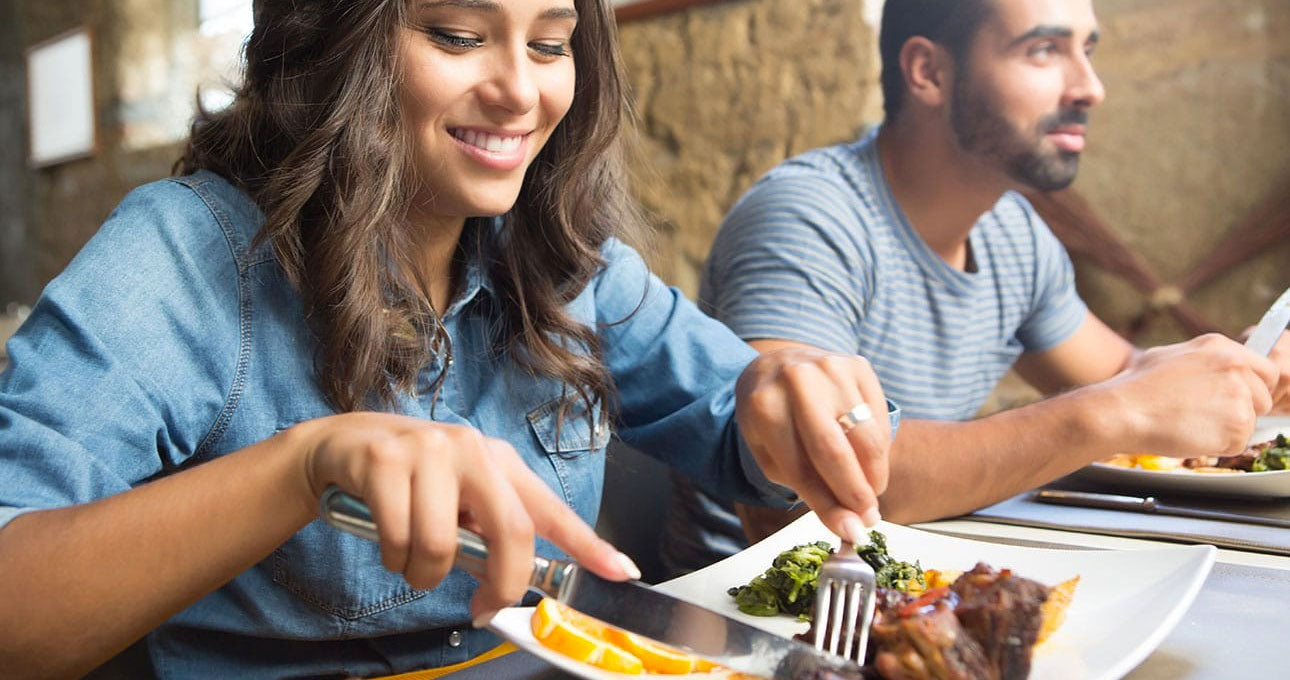No Products in the Cart


For most of us, eating out is never synonymous with dieting. In fact, restaurants are a major saboteur for waist watchers, and a common excuse for why we can’t stick to our plan.
Restaurants make it too easy and too tempting to overindulge. While splurging on food is okay sometimes, if you aren’t smart about your menu choices, you could end up hunting for a larger wardrobe.
So how do you go about sticking to your diet with a T-bone and seasoned steak fries staring you in the face? Is it best to stop eating out? Only eat the salads? Surprisingly, you can eat what you love and still achieve your goals. Here are some tips to follow when dining out on a diet.
Don’t go hungry: This may sound backwards but hear me out – yes, the main reason you are going out to eat is because you’re hungry. But it turns out that having a small snack about an hour before you eat, like a handful of nuts or a small protein shake, can result in a lower overall calorie intake than having nothing beforehand at all. Eating something that isn’t too filling but still satisfying can help you make the smart decision to not go for the double bacon cheeseburger with onion rings. You’ll also eat more mindfully and be more likely to stop when you’re truly full.
Know before you go: Pick up your smart phone and search the restaurant you are going to – the menu is almost always posted on the restaurant’s site or a dining out site. Often the nutrition information is available as well. You can pre-pick what you want that will work best with your diet that day.
Choose a wiser appetizer: Restaurant portions have gotten downright gigantic; depending on where you go, just one meal can feed a whole family! An appetizer is often an excellent substitute for a full entree. The smaller portion is likely more appropriate for your diet than the larger entrée. It’s cheaper too. If you want an app and entree, go for a cup of broth-based soup. Studies show that starting a meal with soup fills you up so you eat fewer calories of your entrée.
Share, not despair: Sharing your food with your dining partner(s) controls portions and adds enjoyment to the meal. It also frees up your discretionary calories so you can indulge in a special drink or a little dessert.
Remember that menus tantalize with lies: Descriptive, strategically crafted food descriptions literally make our mouths water. They help to sell the menu by creating a mental picture in your mind. Seeing words like “velvety,” “juicy,” “fresh,” and” “hand-made” can entice you to go straight for that item. Understanding that these words are nothing but marketing tactics to help sell the item will make it easier to choose a healthier option.
Stay on a calorie budget: You spend only a certain amount of cash on your meal. You should also spend only a certain amount of calories. Fortunately, the first one or two bites of any food are the best; after that, the enjoyment drops off. So enjoy those first few bites and put the rest aside. Save your calories for something truly yummy.
Gourmet, Your Way: Don’t be afraid to ask your server questions about the menu items. It’s part of their job. How is the entrée prepared? Are there options to substitute? Is it a large portion? Can it be steamed instead of fried? Can half of it be wrapped up before serving it? What are the lower calorie or carb or fat options? Asking these questions will help you make more informed decisions when ordering and assist you in your goals.
Don’t choose the booze: Alcohol is not only high in calories, but it messes with your inhibitions, making you much more likely to make choices you’ll regret. It also stimulates appetite suppresses feelings of fullness. A terrible combo for even the most well-intentioned dieter!
Remember that healthy eating is a one-day-at-a-time thing. If you want to have a slice of red velvet cheesecake, that is perfectly fine -- just in moderation, and with caloric tradeoffs elsewhere. Dining out is enjoyable and a wonderful way to bond with loved ones and try new foods. Your diet shouldn’t be enforced at the expense of denying yourself the experience. Eating healthy is all about making the right choices, smart swaps, portion control, and knowing when and how much to splurge.
Someone purchsed a